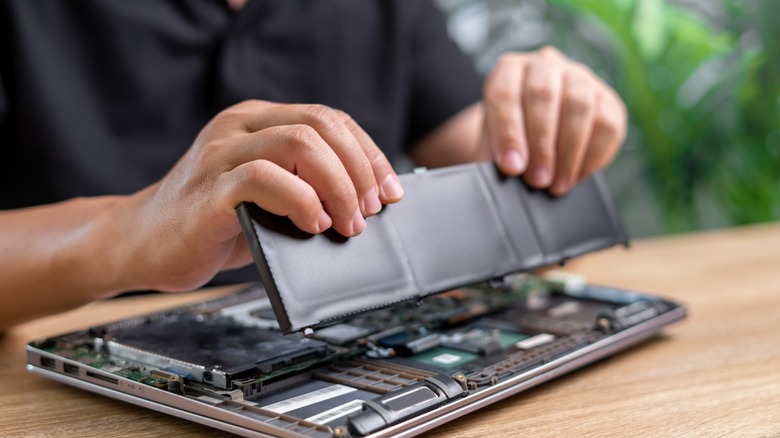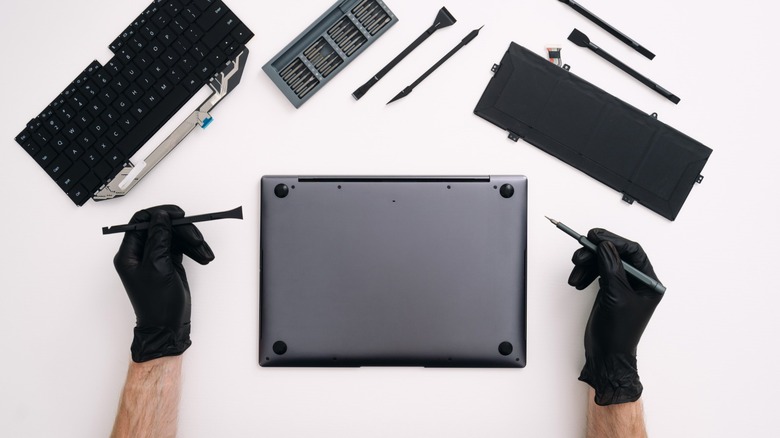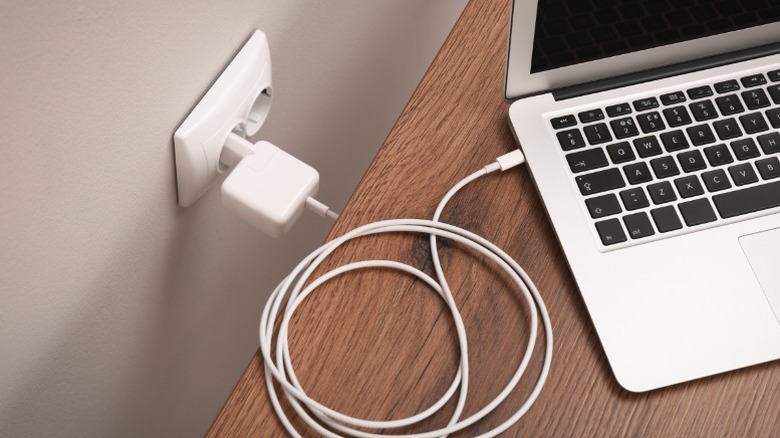What Laptop Batteries Are Made Of (And Why It Matters)
Laptops are the perfect middle ground between smartphones and desktop computers and provide portability without compromising on the sophistication of the tasks you can accomplish on the go. For years, laptop batteries have been infamous for never providing enough juice — pushing users to spot available power outlets nearby and being always connected to them anyway. Fortunately, that has changed in the recent past. Offerings like the MacBook Pro and the Asus Zenbook A14 are thin and light laptops with great battery life that you can pick up today.
Surprisingly, improvements in battery technology in laptops isn't the sole reason we can now crunch hours of work without having to worry about the low battery notification. We also have factors like efficiency gains thanks to faster and better integrated internals and improved optimization in software to thank for. Most laptops still use the familiar lithium-ion battery technology, often abbreviated as Li-ion.
These are the same kinds of batteries that you find in smartphones, cameras, and even electric vehicles. Li-ion batteries can store more energy per unit weight, and it is this higher energy density that makes them favorable for use in portable electronics. It is a tried and tested solution that has been in application for decades, and beyond being safe and durable, Li-ion battery technology is cost-effective and provides easier repairs and replacements.
Are there other kinds of batteries in laptops?
Though most laptops pack in Li-ion batteries, you may have come across product listings that feature Li-Po cells as well. The chemistry behind both lithium-ion and lithium-polymer batteries is quite similar, but they differ in the kind of electrolyte that the cells use. Li-ion batteries use a liquid electrolyte, while Li-Po batteries make use of a gel-like substance. This gives them the ability to be housed in pouches instead of the usual metallic enclosures that Li-ion batteries use.
Manufacturers use Li-Po batteries if space is limited or when the design requires a bit of flexibility — things like ultrabooks and 2-in1 convertible laptops. However, they are often attributed with considerably worse aging, which affects your laptop's battery health. Li-Po batteries are often used in RC vehicles and drones that require faster discharge rates for quick bursts of power. Older laptops also made use of nickel-cadmium batteries, but this technology has largely been phased out and replaced with Li-ion or Li-Po cells that provide better efficiency and portability.
Which laptop battery type is better?
It's unlikely that you will find a modern laptop packing in anything other than a Li-ion or Li-Po battery. Regardless of the technology being used, your laptop's battery life will degrade over time. This degradation is measured in terms of charge cycles — where using up 100% of your laptop's battery ups the counter by one cycle. According to Lenovo, you can expect a laptop's battery to last between 300-500 charge cycles, or around two to five years of use before a replacement may become necessary.
Li-ion batteries generally fare better for long-term durability, thanks to their higher energy densities and less sensitive aging behavior. Li-Po batteries may allow for more creative laptop designs, but are more prone to being damaged. However, factors like excessive heat, poor airflow, and a dysfunctional battery management system can cause swollen laptop batteries irrespective of which lithium-based technology is being used.
How long laptop batteries last will also vary between models. MacBooks are currently some of the best laptops you can buy if battery life is a priority, and Apple makes use of traditional lithium-ion cells to power them. Most modern laptops and phones notify you when the battery degrades beyond a set limit (usually 80%), in which case a replacement can bring back most of the day-one efficiency. Though certain laptops have convenient user-replacement mechanisms that allow you to pop in a new battery yourself, most ultrabooks will require the assistance of a certified professional.


